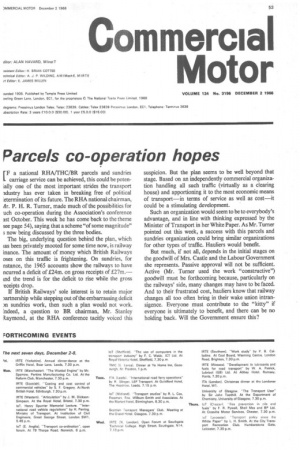Parcels co-operation hopes
Page 55

If you've noticed an error in this article please click here to report it so we can fix it.
rF a national RHA/THC/BR parcels and sundries IL carriage service can be achieved, this could be patenially one of the most important strides the transport adustry has ever taken in breaking free of political letertnination of its future. The RHA national chairman, Ar. P. H. R. Turner, made much of the possibilities for uch co-operation during the Association's conference ast October. This week he has come back to the theme see page 54), saying that a scheme "of some magnitude" s now being discussed by the three bodies.
The big, underlying question behind the plan, which las been privately mooted for some time now, is railway inance. The amount of money which British Railways oses on this traffic is frightening. On sundries, for nstance, the 1965 accounts show the railways to have ncurred a deficit of £24m. on gross receipts of f27m.— Ind the trend is for the deficit to rise while the gross .eceipts drop.
If British Railways' sole interest is to retain major )artnership while stepping out of the embarrassing deficit xi sundries work, then such a plan would not work. Indeed, a question to BR chairman, Mr. Stanley Etaymond, at the RHA conference tacitly voiced this suspicion. But the plan seems to be well beyond that stage. Based on an independently commercial organization handling all such traffic (virtually as a clearing house) and apportioning it to the most economic means of transport—in terms of service as well as cost—it could be a stimulating development.
Such an organization would seem to be to everybody's advantage, and in line with thinking expressed by the Minister of Transport in her White Paper. As Mr. Turner pointed out this week, a success with this parcels and sundries organization could bring similar organizations for other types of traffic. Hauliers would benefit.
But much, if not all, depends in the initial stages on the goodwill of Mrs. Castle and the Labour Government she represents. Passive approval will not be sufficient. Active (Mr. Turner used the work "constructive") goodwill must be forthcoming because, particularly on the railways' side, many changes may have to be faced. And to their frustrated cost, hauliers know that railway changes all too often bring in their wake union intransigence. Everyone must contribute to the "kitty" if everyone is ultimately to benefit, and there can be no holding back. Will the Government ensure this?
































































































































































































